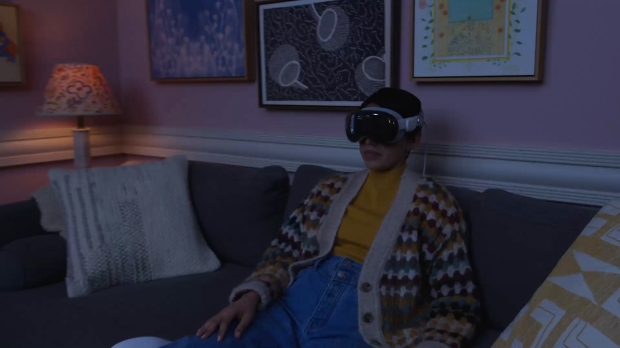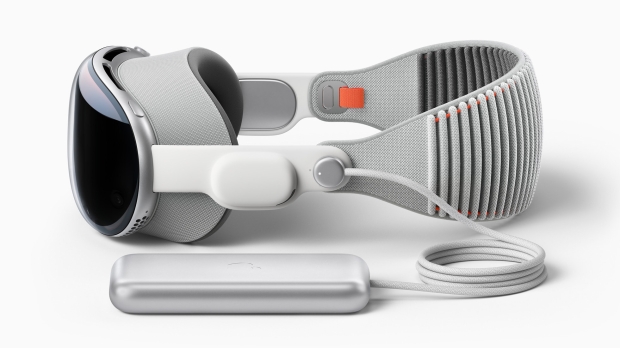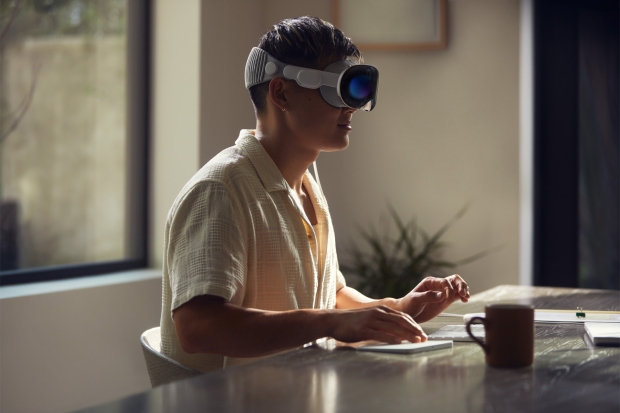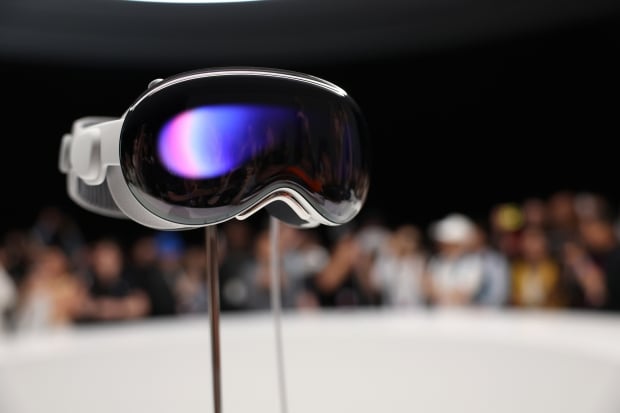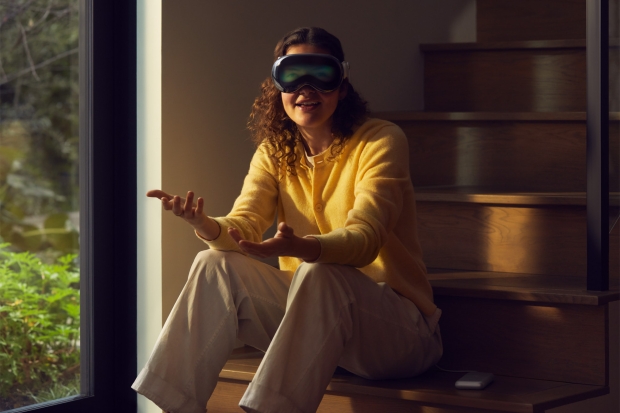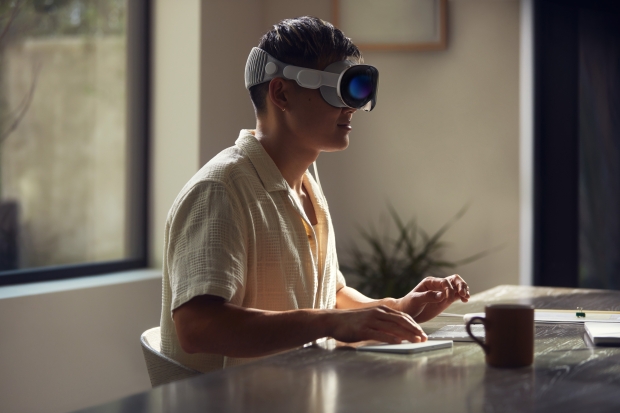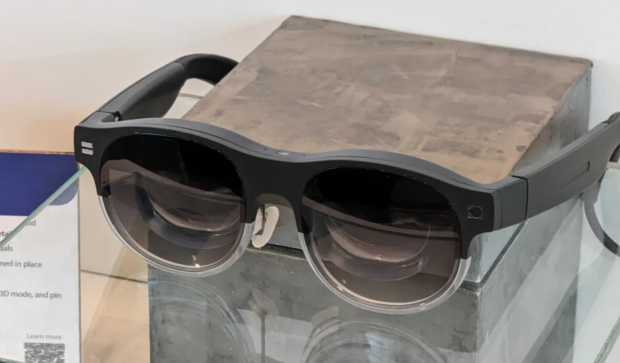Virtual & Augmented Reality and 3D News - Page 11
Your Vision Pro will have a Guest Mode so other people can see what you spent $3,499 on
Apple's Vision Pro will go up for preorder on January 19 before being made available to buy, finally, on February 2. But ahead of those dates, Apple continues to share more details about a headset that promises to be a big deal for a company that rarely ventures into new categories. One of those details revolves around a feature that is designed specifically to make it easier for people to show their new AR/VR headset off to people.
The feature, dubbed Guest Mode, will allow people to give their handset to someone else for them to try on and use temporarily without having to set everything up afresh. It should also mean that no new accounts will need to be created while also ensuring that most sensitive data won't be accessible, too.
Apple hasn't given in-depth information about the way Guest Mode will work, but it did warn that some app content including photo attachments in messages may be visible during the Gust Mode usage. However, the company's press release did note that people's Apple ID settings, Optic ID, passcode, passwords, Apple Pay, Persona, and health data will be restricted while Guest User is enabled.
Apple's international Vision Pro launch could happen sooner than we thought
Apple's Vision Pro mixed reality headset will finally go on sale on February 2, but only to customers who are in the United States. A global launch is obviously in the cards, and now a new report suggests that international customers should start saving for their new headset ASAP because it could be with them sooner than expected.
That's the claim by well-connected supply chain analyst Ming-Chi Kuo in a new post on Medium. The analyst says that Apple has big plans for the WWDC 2024 event that will be held in June of this year and that to make the most of that event it should have the headset available in as many different countries as possible. That, Ming-Chi Ming-Chi Kuo believes, suggests that Apple intends to make the Vision Pro available internationally before WWDC.
The WWDC event is likely to take place in June which means that Apple still has a few months to make sure that the Vision Pro headset is available to as many people, and in as many countries, as possible.
You'll be able to watch HBO's hugely popular TV shows on Vision Pro at launch
If you're picking up a new Vision Pro mixed reality headset in February and looking for new apps to try, there shouldn't be any shortage of options. In fact, one of them will be full to the brim with familiar faces and that app will be HBO's Max. Once installed, the Max app will offer Vision Pro owners quick access to a world of streaming content from not only HBO but also CNN, DC Universe, Food Network, and more.
MacRumors reports that Apple confirmed that Max would be one of the ways people with Vision Pros will be able to watch content in augmented reality, while it will be joined by others including Disney+ and of course Apple TV+, too. We can likely expect more to arrive in the coming months assuming that they aren't in the Vision Pro App Store on day one.
When confirming that the Vision Pro headset will go on sale on February 2, Apple said that its owners can expect to watch content on a display that feels like it's 100 feet wide. That content should look great as well, with full HDR support offered by the Vision Pro's dual 4K displays.
One of the Vision Pro's coolest features might have been canceled ahead of its February launch
Apple is finally set to make the Vision Pro available for preorder this week and then put it on sale in February, but it looks like there might be one feature that won't be there when the headset lands on people's heads. That's despite it having featured heavily in Apple's promotional imagery before being unceremoniously removed at an unknown time.
That feature is one called Open Sky Environment and it's a feature that replaces the ceiling in your room with an outdoor landscape, whether that's an open blue sky or something else. Apple had previously shown the feature off as being used in a home as a woman lays in bed, or on an airplane. However, Apple has now removed all references to the feature on its website.
The change was first spotted by the @M1Astra X account with Apple updating a promotional video to remove the feature. The company has also updated on-page text to remove any mention of the feature, too. At the moment it's unclear when these changes were made so it's possible that the feature was removed a while ago, but it's definitely a feature that has been removed, whenever it might have happened.
Apple Vision Pro headset should feature high-end M2 chipset, which packs more GPU cores
Apple's soon-to-be revolutionary Vision Pro headset is nearly here, and we're slowly getting more details about what is happening inside of the mixed reality headset.
Inside, the new Apple Vision Pro mixed reality headset will feature an in-house M2 and R1 co-processor system, but the higher-end M2 processor with more GPU cores will be found inside of the $3499 headset. It will need the beefier GPU system because the Apple Vision Pro will be powering dual 4K micro-LED screens.
Apple makes its M2 processor in two variants: one with an 8-core CPU and 8-core GPU, while another bumps up to a 10-core GPU that will be found inside of the Apple Vision Pro headset. Apple uses its M2 processors inside of the 13-inch and 15-inch MacBook Air laptops. This is some of the best silicon Apple makes and will be the star of the Vision Pro headset.
Here's how the Apple Store app will tell you which Apple Vision Pro size you need
If you're one of the lucky few that intend to pick up a new Vision Pro at launch you're probably already starting to get excited. The Apple mixed reality headset has a lot to live up to after years of rumors and leaks, but now that it's almost here Apple is getting people ready for a buying experience that will be like no other.
The company, which will put the Vision Pro up for preorder on January 19, has started to email people in the United States to inform them about how the preorder process will work and, importantly, how they will go about making sure that they are ordering the correct size accessories to fit their head and face. And to make that happen, they're going to need to have an iPhone or iPad to hand.
In the emails sent to potential Vision Pro customers, Apple warned that they would need an iPhone or an iPad with Face ID to ensure that they get a process measurement to ensure the Headset's band fits correctly. The email also confirmed that the latest version of the Apple Store app will also be needed in order to complete the detailed face scan, while people who wear glasses will also be able to choose their Zess lens inserts at the point of order. A current prescription will need to be available and provided to Apple at the point of placing the pre-order, too.
Apple may only have 60,000 Vision Pro units available at launch
When Apple announced the Vision Pro headset on June 5 2023 it didn't say anything about availability beyond the fact that it would ship in early 2024. We're now there, and we now know that the headset will hit Apple Store shelves on February 2. But according to one report, we shouldn't expect that the headset will be easy to get hold of - and not just because you'll have to hand over a cool $3,499 to get it.
While the high asking price is sure to also limit the demand for a headset that we've been hearing rumors about for years, analyst Ming-Chi Kuo claims that even if you do have the money to give Apple, you might not be able to. According to him, stocks of the headset are going to be extremely limited.
Writing on X, the supply chain analyst said that Apple will produce between 60,000 and 80,000 units of the Vision Pro ahead of that February 2 release date. That leads him to believe that the headset will sell out soon after release, despite the high asking price.
Continue reading: Apple may only have 60,000 Vision Pro units available at launch (full post)
Apple's Vision Pro loses its 'Pro' moniker as rumors of a cheaper model continue to swirl
When Apple announced the Vision Pro headset back in June of 2023 one of the first things that people noticed was the huge $3,499 asking price. That's the price on the ticket for people who want to see what Apple's spacial computing technology can do when it goes on sale on February 2, but there will likely be a cheaper version in the future. Now, new evidence suggests that will very much be the case and we might even know what it will be called.
That's based on information found in the iOS 17.3 beta 2 code that appears to show that Apple plans on ditching the Pro part of the Vision Pro's name, likely to be used in a cheaper model. Strings that previously referenced the Apple Vision Pro have been changed to just Apple Vision, 9to5 Mac notes.
The report uses the App Store as an example, with previous beta software listing "Mac, iPad, and Apple Vision Pro Apps". However, that has now been changed to list "Mac, iPad, and Apple Vision Apps" which could suggest that a non-Pro headset is in the cards.
Here's how much RAM your $3,499 Vision Pro AR/VR headset will have
When Apple announced its Vision Pro headset, the company said that it would come with an Apple-designed M2 chip inside just like some of the company's most popular Macs of the time. Information beyond that was hard to come by, and Apple kept its cards close to its chest as the weeks and months went by following that June 5, 2023 unveiling. But as we get closer to the headset going on sale on February 2, we're starting to learn more.
One of the tidbits that we've learned of late is that the Vision Pro will ship with 16GB of RAM. That's according to a MacRumors report based on files found in Xcode 15.2 which can be downloaded today. This also happens to back up a previous report by Bloomberg's Mark Gurman that had also pointed to 16GB of RAM being paired with that M2 chip.
While 16GB is of course more than the 8GB that some of Apple's Macs ship with as standard, it's difficult to know how well the Vision Pro will perform. It's the first of its kind which makes benchmarking its specs hard, so we might have to wait for the headset to begin arriving in the hands of paying customers before we can be truly sure what's going on in terms of capabilities and performance.
Continue reading: Here's how much RAM your $3,499 Vision Pro AR/VR headset will have (full post)
ASUS reveals high-tech glasses that generates multiple displays at CES 2024
The Consumer Electronics Show (CES) is always full of surprises, and this year, ASUS had one of them with the unveiling of the AirVision M1, a wearable device that gives users the ability to generate multiple virtual displays.
ASUS has announced the AirVision M1, a wearable display that packs a multi-monitor experience all within a pair of glasses. The company explains that this wearable features a 1920 x 1080 Micro OLED display that is capable of 1100 nits and a 95% DCI-P3 color gamut for those juicy visuals. According to ASUS's press release, users are able to drag and drop virtual screens to specific locations in their preferred aspect ratio: 16:9, 21:9, 32:9, and more.
Users interact with the glasses via a touchpad located on the left temple. This touchpad allows for customization for brightness, 3D mode activation, and screen pinning. Furthermore, the AirVision M1 is equipped with a USB-C port for charging, features DisplayPort Alt Mode for widespread compatibility, TUV-certified low blue-light and flicker reduction, noise-canceling microphones, and speakers.


